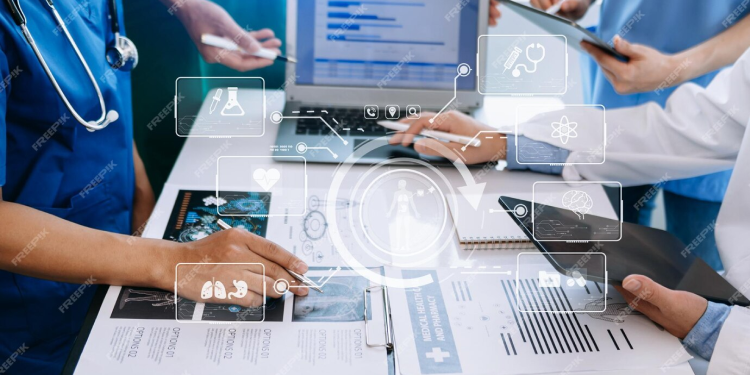In the healthcare segment, innovation and necessity go hand in hand. The union of technology and the healthcare system is helping to boost patient care quality. Other than care quality, the management and operational efficiency of the healthcare system is getting a major boost with the coming of healthtech. In the pursuit of such better outcomes, healthcare software development has seen a significant spike in demand. It positions itself as a major transformative force that is reimagining the healthcare landscape.
For quite a long time, the healthcare industry has resorted to traditional and old-fashioned methods, which often bottlenecks the process. To counter these, the move to efficient solutions from healthcare software development has genuinely helped one and all.
In this article, we will discuss how healthcare software development is reshaping public health initiatives.
Let’s begin!
Types of Solutions Offered by Healthcare Software Development
Electronic Health Records (EHR)
Electronic health records (EHR) enable the digitization of patient records so that healthcare professionals can access them at their convenience. They help store and manage crucial patient data, including medical history, treatment plans, and past health test reports.
Electronic Medical Records (EMR)
EMR and EHR are closely related and can be compared. EMRs are known for focusing on a single healthcare practice. The major focus of the EMR is recording the medical background of the patient.
Practice Management Software
Customized software development service also offers software for practice management to assist with administrative duties. Be it appointment scheduling, insurance claims, or patient communication, the software helps to ease the burden of administrative work in a healthcare facility.
Telemedicine and Telehealth Software
Telemedicine have been a booming phenomenon in health tech ever since it came into being popular during the period of COVID-19. This software allows the patient to remotely access their healthcare providers for treatment and advice without physically visiting the healthcare center. This is extremely important for those who live in rural parts of the country.
Medical Imaging Applications
Healthcare providers often spend a lot of their time analyzing medical scans, such as X-rays, MRIs, and CT scans. Radiology Information Systems (RIS) and Picture Archiving and Communication Systems (PACS) are known to effectively assist in interpreting medical scan pictures. This is a significant innovation in healthcare software development because it helps providers cut time and effectively address more patients in a day.
Now that you know about the various innovations in healthcare software development, let’s understand their impact on Public health initiatives.
Impact of Healthcare Software Development
Operational Workflows
Healthcare software development companies have brought about exciting innovations that have replaced many paper-based processes with electronic alternatives. Be it appointment scheduling or patient billing, they are digitized, and hence, the chances of manual error are absolutely zero. This significantly improves the quality of interaction between the organization and the patient. Digital means have completely replaced the age-old complicated data retrieval process. Also, with this, information sharing in healthcare organizations has become a lot more efficient than before.
Patient Care
With innovations from healthcare software development seamlessly integrated into the system, patients are reaping benefits. They now have many more tools and resources that can give them in-depth information about their health. These technologies have enabled patients to receive care from providers without leaving the confines of their homes.
Healthcare software development has also brought with it innovative IoT devices that make healthcare data monitoring easier. Be it activity tracking, vital signal monitoring, or medication reminders, the technology helps patients in the best manner to improve the care quality.
Data Management
With custom healthcare software development, data management in healthcare organizations has become much more streamlined. The idea of EHR and EMR helps drastically centralize patient data and completely removes any need for physical storage. This also allows rapid retrieval of any data with the click of a button, and hence, providers get a comprehensive view of patient data for better treatment.
Additionally, the huge volume of patient data also helps in data analytics and machine learning in healthcare. With such tech, it is easier to understand trends and disease patterns and better-personalized treatment plans.
Conclusion
The landscape of public health initiatives is being fundamentally transformed by the advancements in healthcare software development. These innovations are not just reshaping how care is delivered but are also enhancing the efficiency and effectiveness of healthcare operations. Through the implementation of solutions like Electronic Health Records (EHR), Electronic Medical Records (EMR), practice management software, telemedicine, and medical imaging applications, healthcare providers are now equipped with tools that enable them to offer superior patient care while optimizing their workflows. The digitization of healthcare processes has led to a significant reduction in manual errors, improved patient-provider interactions, and a more efficient sharing of information within healthcare organizations.
Moreover, the integration of IoT devices and the utilization of data analytics and machine learning are paving the way for a future where healthcare is more personalized, proactive, and predictive. These technologies are instrumental in monitoring patient health, understanding disease patterns, and developing treatment plans that are tailored to patients’ individual needs.
As we move forward, it’s clear that healthcare software development will continue to play a pivotal role in the evolution of public health initiatives. The ongoing collaboration between technology and healthcare professionals promises not only to address the current challenges but also to anticipate and mitigate future health crises. By continuing to embrace and invest in these technological advancements, the healthcare industry is setting a new standard for how care is provided, ensuring that it is more accessible, efficient, and effective for everyone involved. This paradigm shift marks a significant milestone in our collective journey towards a healthier, more informed, and connected world.

